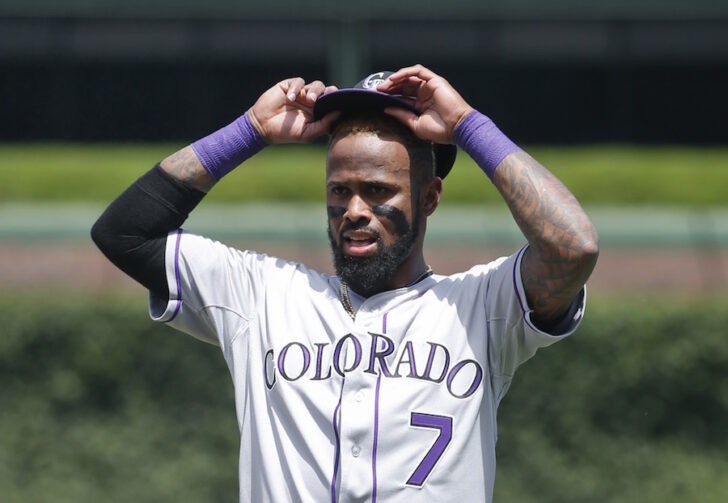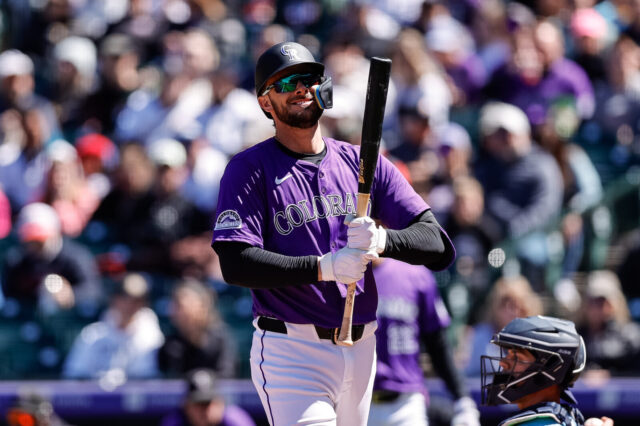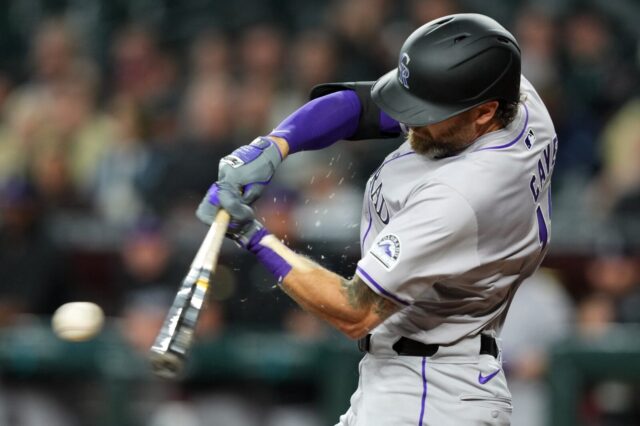Amidst the euphoria of Trevor Story, plenty of Rockies fans have conveniently forgotten about the curious case of Jose Reyes, the shortstop who originally replaced Troy Tulowitzki.
But on Sunday, Reyes’ name founds its way into the headlines once again. And what followed made his situation even stickier, for both Major League Baseball and the Colorado Rockies.
A quick refresher: Reyes was involved in a Halloween 2015 domestic violence incident in Hawaii, but has never been criminally charged; his wife stopped cooperating with prosecutors, so the case has been dropped for now. (The charges are being asked to be dropped without prejudice, meaning Reyes’ wife has until October 31, 2017 to refile charges if she so chooses). So now the matter of what to do with Reyes is in the hands of MLB commissioner Rob Manfred.
On Sunday, MLB Network’s Jon Heyman offered some speculation as to what will likely happen to Reyes. Basically, he suggested that the Rockies shortstop, who’s been on a paid leave of absence thus far this season, will be handed a 60-game suspension, maybe more. The games Reyes misses, whatever they end up being, will be unpaid by the Rockies. Heyman’s logic is supported by the handling of Aroldis Chapman, who became the first MLB player to receive a ban under the league’s domestic abuse policy. Chapman got 30 games, but most believe Chapman’s missteps will be viewed as less directly physical (Chapman admitted to firing a gun into a wall, but denied physically hurting his girlfriend).
While we can debate the practice of professional sports leagues and associations having a bigger impact than the Constitution of the United States and that whole “innocent until proven guilty” concept (that’s an entirely different column), here’s how the math works out in this particular case: Reyes is making $22 million this season. If he were to earn an 80-game suspension from MLB, he’d lose roughly $11 million. He’s due $22 million in 2017, and in 2018, whoever holds his contract could either pay him another $22 million, or utilize a $4 million buyout.
The entire situation has put the Colorado Rockies between a rock and a hard place, to say the least.
To begin, they don’t want Reyes at all – nor should they, regardless of what kind of person Reyes is, innocent or guilty. There’s no stopping the Trevor Story train, which has already left the station at full steam. Even if Reyes had been found completely innocent by the law and MLB, he’s still the past and Story is the future. But of nearly equal importance, is the matter of paying Reyes. The Rockies don’t want to pay him, but with a contract like that, and a serious suspension that’s moving from looming to likely, who’s going to take Reyes off their hands?
Nobody.
Whatever will the Rockies do? If you want to hypothesize, a precedent has already been set by the Rockies.
If Major League Baseball is so embarrassed and ashamed over Reyes’ actions that he’s given a punishment of 60-80 games, then it’s safe to assume the Rockies feel the same way (or at least close). We can be critical of the Rockies for their play over the past six seasons, but we can’t say the Rockies are bad guys. They aren’t. Generally speaking, Rockies players are squeaky clean. Forgetting for a moment about money, batting average or Trevor Story, the Reyes situation does not fit within their standard operating procedure.
That’s always been the case. The Rockies make it a practice of employing extremely solid citizens off the field. And late in 2004, when Rockies pitcher Denny Neagle was arrested in Lakewood on charges of soliciting a woman for prostitution, they made no bones about how they felt. They didn’t even wait for Neagle’s court case. Neagle pleaded not guilty and was scheduled to be in court on Jan. 27, 2005. The Rockies told him to hit the road – and that they would not be paying him – on Dec. 6, 2004. The organization based its legal argument on Paragraph 7(1)b of the uniform player’s contract, which stated that a club may terminate a contract if a player should “fail, refuse or neglect to conform his personal conduct to the standards of good citizenship and good sportsmanship.”
With the benefit of hindsight, we know the Rockies theory didn’t hold up; they ultimately had to pay up. Neagle was still owed $19.5 million, and after the settlement, he walked away with $16 million.
But he never donned Rockies purple – or any MLB jersey – again. His baseball career just vanished, albeit with $16 million in hand.
If history is an indicator, the Rockies will go the same route with Reyes, who could still command somewhere in the neighborhood of $37 million ($11 million this season, $22 next, plus the $4 million buyout). Perhaps the Rockies forfeit all of it. Perhaps they end up absorbing a big chunk, making Reyes more palatable for a team in need of a veteran shortstop but not wanting to pay top dollar for the headache that will follow. After all, Reyes still has value as a player, assuming he’s in someone’s lineup. No matter, the Rockies will be eating a lot of dough just to rid themselves of their “other” shortstop.
Just like Neagle, Reyes is less than worthless to the Rockies.
But for an ownership group that is often accused – fairly or not – of being “cheap” or “all about bottom line,” the Reyes situation simultaneously presents a golden opportunity to dispel that myth.
If the Rockies let go of Reyes and endure the accompanying financial misfortune, they will be making an undeniably strong statement.
Being “good” is more important than profitability.



